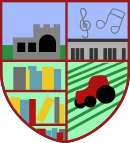Computing
At Newborough C of E Primary School, Computing is taught discretely and as a means for supporting other areas of the curriculum. We use of a range of electronic devices including ipads, laptops, digital cameras, visualisers and roamers throughout the school. The children are encouraged to communicate ideas and information in a variety of ways using appropriate software to enhance their learning. There are four main areas in the computing curriculum:
- Understanding computer networks
- E-safety
- Digital Literacy
- Programming and Coding
Our Computing Curriculum equips pupils to use computational thinking and creativity to understand and change the world. Computing has deep links with mathematics, science and design and technology and provides insights into both natural and artificial systems. The core of computing is computer science, in which pupils are taught the principles of information and computation, how digital systems work and how to put this knowledge to use through programming. Building on this knowledge and understanding pupils are equipped to use information technology to create programs, systems and a range of content. The approach ensures that pupils become digitally literate – able to use, express themselves appropriately and develop their ideas through information and communication technology – at a level suitable for the future workplace and as active participants in a digital world.
Our curriculum for Computing aims to ensure that all pupils:
- can understand and apply the fundamental principles and concepts of computer science, including abstraction, logic, algorithms and data representation
- can analyse problems in computational terms, and have repeated practical experience of writing computer programs in order to solve such problems
- can evaluate and apply information technology, including new or unfamiliar technologies, analytically to solve problems
- are responsible, competent, confident and creative users of information and communication technology
- have a thorough understanding of e-safety and how it affects them and others.
Key Stage 1
Pupils are taught to:
- understand what algorithms are, how they are implemented as programs on digital devices, and that programs execute by following precise and unambiguous instructions
- create and debug simple programs
- use logical reasoning to predict the behaviour of simple programs
- use technology purposefully to create, organise, store, manipulate and retrieve digital content
- recognise common uses of information technology beyond school
- use technology safely and respectfully, keeping personal information private; identify where to go for help and support when they have concerns about content or contact on the Internet or other online technologies.
Key Stage 2:
Pupils are taught to:
- design, write and debug programs that accomplish specific goals, including controlling or simulating physical systems; solve problems by decomposing them into smaller parts
- use sequence, selection, and repetition in programs; work with variables and various forms of input and output
- use logical reasoning to explain how some simple algorithms work and to detect and correct errors in algorithms and programs
- understand computer networks, including the internet; how they can provide multiple services, such as the World Wide Web, and the opportunities they offer for communication and collaboration
- use search technologies effectively, appreciate how results are selected and ranked, and be discerning in evaluating digital content
- select, use and combine a variety of software (including Internet services) on a range of digital devices to design and create a range of programs, systems and content that accomplish given goals, including collecting, analysing, evaluating and presenting data and information
- use technology safely, respectfully and responsibly; recognise acceptable/unacceptable behaviour; identify a range of ways to report concerns about content and contact.
Online Safety
Online Safety will be taught through specific lessons and continuous provision, advice and support.
In Key Stage 1, children will be taught to use technology safely and respectfully, keeping personal information private; identify where to go for help and support when they have concerns about content or contact on the Internet or other online technologies.
In Key Stage 2, children will be taught to use technology safely, respectfully and responsibly; recognise acceptable / unacceptable behaviour; identify a range of ways to report concerns about content and contact.
For further information, please read the advice from Childnet and / or Think U Know. We also ask that children follow our Acceptable Use Policy as this makes sure that the children understand how to best use technology within our school.
Pupil Quotes:
"I enjoy using different technology to do my work. Computers and ipads are both good but you get to use different programmes and they help you with spelling."
"I am getting faster at typing all of the time!"
"Computing is fun because we get to use different apps and we can work together."
"I know how to be safe when using the Internet".
